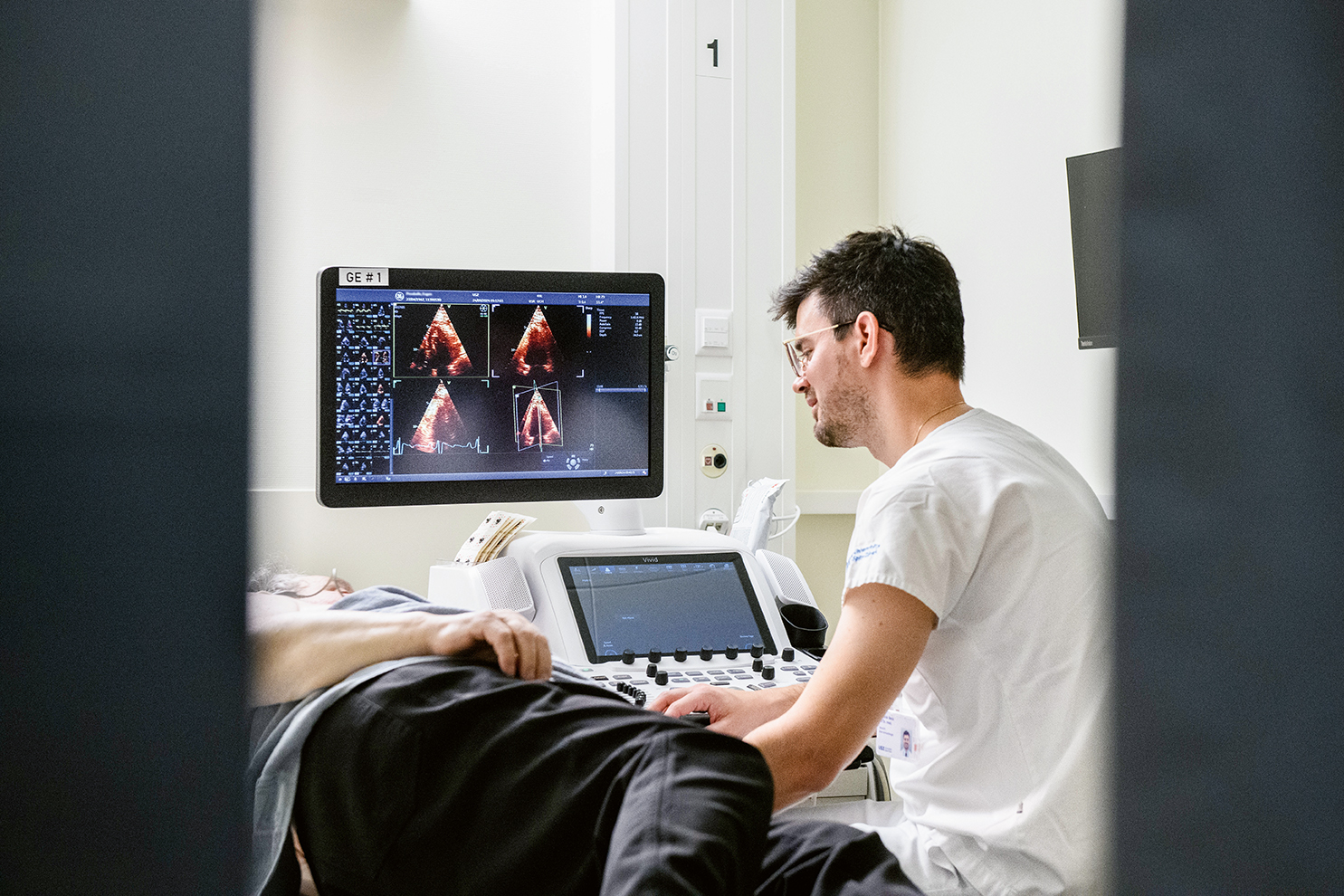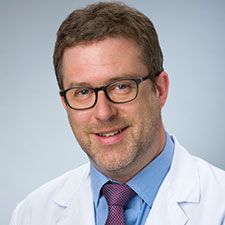When the heart fails to pump sufficient blood, organs are deprived of oxygen and nutrients, leading to illness. The USZ has an outpatient clinic where a specialized team treats affected patients.
Heart failure, also known as cardiac insufficiency, is a widespread disease that affects around 300,000 people in Switzerland. It is therefore the most common and deadliest of all heart diseases. It often affects older people and is often the result of a pre-existing condition such as high blood pressure or narrowed coronary arteries. As a university center, the USZ offers comprehensive diagnostic facilities and modern treatment options. Every year, around 3500 consultations are carried out in the heart failure team’s consultation hours.
Early detection improves prognosis
On average, a healthy heart pumps around 80 milliliters of blood into the body of an adult 70 times a minute. During physical exertion, this volume increases several times over. Heart failure occurs when the heart muscle can no longer pump enough blood, which leads to an insufficient supply of oxygen and nutrients to the organs. Typical symptoms of heart failure are shortness of breath, swollen legs, tiredness and reduced performance. In addition to high blood pressure and narrowed coronary arteries, the causes include myocarditis, heart valve defects, amyloidosis, congenital heart defects or cardiac arrhythmia.
“Heart failure is a broad field and at the USZ we can offer holistic treatment for affected patients. From diagnostics to find out where the heart failure is coming from to the appropriate therapy,” explains Andreas Flammer, who heads the heart failure department at the USZ. Heart failure is the last stage of heart disease. The prognosis depends heavily on the general health, age and lifestyle of those affected. Early detection of the disease and consistent treatment can significantly improve the quality and expectation of life.
“A lot can be achieved with medication. In recent years, numerous new active substances have been developed that significantly improve the prognosis.”
Careful diagnostics for optimal therapy
The diagnosis begins with a comprehensive medical history and physical examination. “The area of heart failure at the USZ is well networked internally and interdisciplinary,” says Andreas Flammer. A typical patient is referred by a cardiologist in private practice who wants him to be seen and evaluated at a center. Andreas Flammer and his team carefully assess the patient’s condition. This usually includes echocardiography, special stress tests, but also catheter examinations to obtain a detailed picture of the heart. If the disease is stable, the patient can be treated as an outpatient. If his condition deteriorates, he may need to be treated in hospital, where he will also receive acute medical care to stabilize his heart. Specialist doctors now have a wide range of options and therapies available to treat the disease.
Therapy for heart failure
The treatment of heart failure involves both medication and technical devices, such as specialized pacemakers, defibrillators or monitoring systems, which work hand in hand and are used by an interdisciplinary team of experts to achieve the best possible result.
Wide range of treatment options
The treatment of heart failure at the USZ includes various approaches, ranging from drug therapies to complex surgical interventions. “A lot can be achieved with medication. In recent years, numerous new active ingredients have been developed that significantly improve the prognosis,” says Andreas Flammer. In addition to medication, there are interventional procedures such as the treatment of coronary heart disease or the correction of heart valve defects. Atrial fibrillation or arrhythmias can be treated with ablation. In the case of advanced heart failure, implantable defibrillators and special pacemakers are used to synchronize the heart. Specialists in heart failure, rhythmology and interventional cardiology work hand in hand in the catheterization laboratory.
The treatment options are varied and individually tailored to the patient’s needs. “Not everything that is feasible is also sensible. Our job is to take a holistic view of the heart patient,” emphasizes the heart failure specialist.
Interdisciplinary cooperation is key
A special feature of the USZ is the close interdisciplinary cooperation. Heart failure specialists are on duty throughout the hospital, go on ward rounds if necessary and closely observe the patients concerned. “One characteristic of this disease is that patients can ‘decompensate’, i.e. the body can no longer compensate for the defects caused by the disease. As a result, water can accumulate in the legs or on the lungs, which can lead to breathing problems and, in the worst case, to a transfer to the intensive care unit,” explains Andreas Flammer.
If the disease is very advanced and such decompensations keep occurring despite the therapies mentioned, there are three options: A so-called AssistDevice, a type of “artificial heart”, can be inserted, or a heart transplant can be performed. Those affected must qualify for both. However, if the decision is made in favor of palliation, patients are cared for until they die.
Artificial hearts and heart transplants
AssistDevices and heart transplants fall into the area of highly specialized medicine (HSM) and may only be performed by three centers in Switzerland. One of these is the USZ. Affected patients are thoroughly assessed by the heart failure team and cared for before and after the procedure. To this end, the team works very closely with Clinic Director Omer Dzemali and his cardiac surgery team, as well as with anesthetists, intensive care physicians and other specialists from other disciplines. The interdisciplinary Heart Team is responsible for making decisions on these far-reaching therapies. “Patients can live well with an AssistDevice and, if necessary, bridge the time until the heart transplant. After the transplant, a new life begins for patients,” explains the specialist.
Interdisciplinary Heart Team
Every year, 10 to 20 patients are transplanted at the USZ and around the same number receive an AssistDevice. They all need comprehensive aftercare. The heart failure team cares for these patients around the clock in specialized outpatient clinics, even after implantation or transplantation. The adjustment of immunosuppression is a particular challenge and requires the knowledge of specialists. The same applies to the regularly required biopsies of the heart.
Achieving a better quality of life
Heart failure is a complex chronic disease that requires comprehensive and individualized treatment. The USZ has state-of-the-art diagnostic and therapeutic facilities and interdisciplinary processes at its disposal. “Our job is to carefully assess which therapy makes sense for each patient and when. With our work, we can help to improve the quality of life of our patients,” emphasizes Andreas Flammer.

